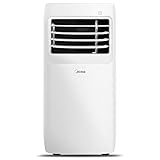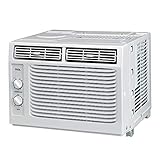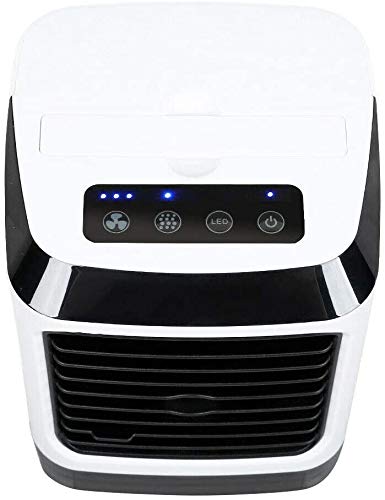Camping is beautiful, healthy, and one of the most fun activities that people, couples, partners, and friends can participate in. Packing might be tricky to some; navigating dense woods might be hard for others, but cooling off in a dense little hotbox is what bothers most people, especially during warm, summer days.
That’s why more and more people are bringing their ACs along on the road; air conditioners are typically meant for houses and apartments, but they can also be used to regulate the temperature, dehumidify the air, and cleanse the environment from germs, smoke, and staleness.
That’s why today we’re here with the list of the best tent air conditioners.
Best Tent Air Conditioner
JHS Portable 3-in-1 Air Conditioner
The JHS portable AC is, in our humble opinion, the best tent air conditioning device you can have. It’s not overly big, it’s exceptionally strong, and since it’s meant for smaller and medium-sized apartments it is capable of cooling off a larger tent space in mere minutes.
It boasts a highly reliable compressor and three separate functions, including a cooling fan, a dehumidifier, and air conditioner modes. Furthermore, it packs a neat remote controller with a clearly visible LED panel, which will give you access to all of its features from anywhere within (or outside) of the tent.
The obvious downside is that it works on electricity, but it compensates for this little flaw with a plethora of top-shelf features it comes supplied with. Again, this is a remarkably strong unit that is perfect for cooling joint tents; it might be a bit of overkill for smaller and moderately-sized tents.
Pros:
- Super strong 3-in-1 AC
- Several separate functions
- Robust and reliable
- Built to last
Cons:
- Pricey
- Not exactly great for smaller tents
Midea MAP08R1CWT 3-in-1 Air Conditioner
Next up is Midea’s MAP081R1CWT; this is a mid-range AC unit designed for smaller apartments, which makes it great for even the largest of tents. It’s just slightly weaker than our previous pick, but it still packs more than enough strength to cool off areas up to approximately 150 square feet.
This air conditioner is operated by a remote controller, which features a highly visible LED display; furthermore, you can use it to select one of the three different modes (AC, dehumidifier, and cooling), a 24-hour timer, time, and more.
It’s pretty easy to set up under normal circumstances, but you might need to be a little crafty to install it in a camp. Just like most conventional AC units, it has a smallish exhaust hose, which means that you’ll need to find means to affix it and keep it outside of the tent.
Pros:
- Very easy to use
- Strong and exceptionally versatile
- Reusable and fully washable filters
- Relatively small design
Cons:
- Tricky setup
ZeroBreeze Portable Air Conditioner
ZeroBreeze’s portable AC is an excellent choice if you don’t want to bother yourself with clunky, electrical-powered conditioners. It works on batteries and is actually pretty strong given its price. Speaking of which, it’s decently cheaper and almost equal in terms of strength when compared to some of our earlier picks.
Its main benefit is that it can be used as-is straight from the bat; it doesn’t need any kind of setup, and it has a built-in handle that allows you to reposition it and carry it around pretty easily. On the downside, it’s fairly noisy.
Overall, this portable air conditioning device is moderately strong, it packs a water-resistant shell, and it is much more mobile and compact than most portable air conditioners. We warmly recommend you try it out if you are not satisfied with the price tags of portable ACs and the weak performance of tiny AC models.
Pros:
- High value for the money
- Compact and portable
- Water-resistant construction
- Adequate size and performance for tents and camping
Cons:
- A bit flimsier than average due to plastic build
- Pretty noisy
TCL 5WR1-A Window Air Conditioner
A lot of people avoid window-mounted ACs for camping simply because they’re pretty hard to install, especially tents are enclosed by design. However, it’s air conditioners such as TCL 5WR1-A that are cheaper and smaller while offering the same amount of power.
Speaking of which, this model is available in six different versions, ranging from 5,000 BTU (British-Thermal-Units), over 6,000, to 15,000 BTU. In all fairness, the weakest-output model is all you need for camping, even if you have some of the most massive tents.
This AC is relatively simple to install, it packs mechanical controls that offer two selectable speeds, and it comes supplied with washable and completely reusable filters that reduce bacteria and room smells and odors.
Pros:
- Available in different power-setting variations
- Mechanical controls
- Selectable cooling and fan speeds
- Washable filters
Cons:
- Noisy
CJC Portable Air Cooler
We’re entering the sphere of tiny ACs with CJC’s portable air cooler. This is a super-small 3-in-1 air conditioner that features three selectable fan speeds, as well as air purification, air cooling, and humidification modes.
One of the best things about this AC is that it works on water; it sports a 480 ml water reservoir that is large enough to provide up to 8 hours of working time. Additionally, it’s pretty cheap, and it boasts a nearly soundless method of operation.
Pros:
- Quick and reliable cooling
- Water-based operation
- Spacious water tank
- Petite and durable
Cons:
- Slow and unequal air purification and humidification effects
Anbber Portable Air Conditioner
Next up is Anbber’s Portable AC; it’s a unique air conditioner that is perfect for camping because it features a special ‘feeding’ system that allows you to easily control the temperature drops.
It works on water, and adding some will lower the temperature in the area by 3-5 degrees C; however, adding an ice cube (or larger quantity of water) will double the drop rate.
We mainly picked this model for our review because it’s eco and environmentally friendly; it’s also very small and features an optional USB connection mode. It is, however, slightly weaker than an average mid-range air conditioner.
Pros:
- Exceptionally small and portable
- ‘Feeding’ mechanism with a water tank
- Environmentally friendly and quiet
- Easy to operate and carry
Cons:
- Fairly weak performance
KoGI24 Portable Air Conditioner
Our next pick is KoGI24’s portable AC. Essentially, this is an entry level air conditioning device that works on batteries; it features a built-in 2000 mAh Li-Ion battery that can provide up to 5 hours of continuous operation. What’s more, it also boasts fast-charging properties.
Another cool feature of this AC is that it rocks ice-cold air and spray functions (similar to humidifier and fan settings). These modes are perfect for hot summer days since they can lower the temperature in the tent drastically fast; these modes do, however, drain up the battery faster.
Pros:
- Unique modes
- Quick cooling modes
- Features a built-in rechargeable battery
- LED lights, convenient at night time
Cons:
- Flimsy plastic construction
Lroplie Portable Air Conditioner
Next up is Lroplie’s portable AC; basically, this is a strong water-powered air conditioner that offers three different fan speeds, seven different colors, and a fully rechargeable battery.
It has a 500 ml water reservoir that should give you around eight hours of continuous operation; if you happen to run out of refillable water, you can switch over to USB connectivity mode. In a nutshell, this is a small, decently strong and versatile AC that is perfect for campers on a budget.
Pros:
- Affordable and valuable for the cash
- Multi-LED colors
- Selectable wind speeds and connection modes
- Fairly strong performance for the buck
Cons:
- Portable, but slightly less stable than average
FitFirst Portable Air Conditioner
FitFirst portable AC is our recommendation for campers who are looking for a pocket air conditioner that can chill out the air in the tent quickly and efficiently. This is a tiny AC unit that requires no installation or electricity; it features a smallish water reservoir and a built-in battery that can give up to 12 hours of continuous operation when combined.
It also sports selectable fan speeds, although using it at higher settings tends to drain more water (and battery).
Overall, this is an excellent choice if you’re low on cash and are looking for a small, high-quality air conditioner for camping.
Gurongkeji Mini Air Conditioner
We’re wrapping up with one of the cheapest tent air conditioners on the market, which is a model from Gurongkeji; essentially, this is a super-light AC with dimensions that measure 6 inches by 5.6 inches by 6.5 inches.
This basically means that you’ll be able to fit it in any area of the tent without having to re-organize any other items. Its petite size is its strongest point.
Another reason why we thought Gurongkeji’s portable AC is cool is that it uses water; it packs a 300 ml water reservoir, which will be able to provide you with five hours of continuous use before you need to refill. It also has three selectable speeds, although it’s pretty weak in general.
Consider this model if you want to cool off a bit, but don’t expect it to change the temperature in your tent drastically.
Pros:
- Dirt-cheap and expendable
- Operates on water
- Five hours of continuous use
- Miniature footprint
Cons:
- Pretty weak
Tent Air Conditioner Buying Guide
Buying an AC for your house is much different than buying an AC for camping and tents. Some people have the luxury of owning one AC that can be used in both scenarios, but that’s usually not the case. The first thing you’ll need to decide is what type of AC you want.
Electricity-based air conditioners are usually a bit harder to set up; they require a source of power, and they’re typically expensive. However, they are by far the strongest AC type, and they can be used to cool down several tents and the surrounding area at the same time.
Water-powered air conditioners are typically low-performance models that can work indefinitely for as long as you refill the water canister. Their weakness is that they require quite a bit of time to properly cool down an area. On the upside, these models are eco-friendly and usually small and highly portable.
Battery-powered air conditioners bring the best of both worlds together; they’re smaller than electricity-powered models, and they are stronger than water-powered ones. The batteries that these air conditioners usually have are typically rechargeable.
There are numerous water-powered AC units that feature optional battery connectivity modes; these are also viable options, especially if you want the air conditioner to keep running for longer periods of time. Combining the power from the water reservoir with batteries will grant you more operational time.
Additionally, most AC units have selectable modes, fan speeds, timers, and similar features; consider these for extra convenience.
Frequently Asked Questions
Are AC units usable in tents?
Air conditioners are safe to use in tents if they are connected properly; the water-powered ones might drench the tent a bit; the ones working on batteries are safe if the battery is at least relatively new. The situation with electricity-powered ones is a bit different, as you’ll need to ensure all the lines are properly connected.
Which type of AC is best for tents?
Most people opt for water-powered AC units simply because these are the most environmentally friendly types. Battery-powered air conditioners are also fine; campers who do not power their campsite won’t find electricity-based AC models as very useful.
Are air purifiers able to cool a tent?
Air purifiers are not coolers, so in short words – no, they can’t cool a tent. They can bring different benefits to the table, though; they can eliminate stale air and nasty smells pretty quickly.















Leave a Reply